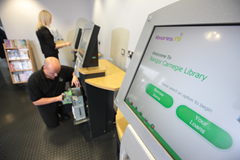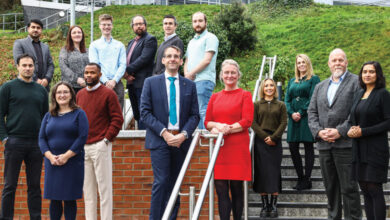Amey leading the way technology solutions
 Library customers are benefiting from Amey’s innovative technology solutions.
Library customers are benefiting from Amey’s innovative technology solutions.
Leading public services provider Amey is helping to create ‘Libraries of the Future’ across 99 sites in Belfast, where state-of- the-art technologies will improve the customer experience and generate efficiencies around the clock.
As public libraries face unprecedented financial pressures, Amey and Libraries NI are implementing a single computerised library service. New technologies will allow customers to check multiple items in at once, pay charges and return items without assistance from library staff. This means staff are freed up to provide additional support to customers.
Amey also expects to save 520,000kg of carbon emissions in one year, through introducing power-saving software in around 2,000 computers.
It forms part of the Electronic Libraries for Northern Ireland project, which is aimed at improving customer satisfaction through creating a single, computerised library service with a common catalogue and stock, providing free internet access in every library and expanding public access and learning opportunities.
Amey, which employs 250 people in Northern Ireland, has been responsible for managing the entire library information and communications technology (ICT) infrastructure across 99 sites for the past 10 years through a contract with Libraries NI.
This approach means Amey can use the most innovative solutions to make efficiencies and manage thousands of assets in the Libraries NI estate.
In 2002 the contract was recognised by the Office of Government Commerce as an exemplar ICT PFI. It was the first contract of its kind in the UK to share between library authorities, a single network infrastructure across all areas of business.
The Library of the Future
Under this scheme, Amey provides a number of ICT services, including IT infrastructure and network managed services, desktop and network management, software technical support, network security and disaster recovery, public user authentication, 3G and satellite technology and RFID which allows library customers to check multiple items in at once without assistance from library staff.
Delia Campbell, account manager at Amey said: “Libraries are not just about books; they’re multimedia centres. We believe in continuing that modern approach throughout the service to generate the best experience for customers as well as create efficiencies, at a time when budgets are being tightly squeezed.”
 Radio Frequency Identification
Radio Frequency Identification
Radio Frequency Identification (RFID) technology allows a device to read information contained in a wireless device, and provides a method to transmit and receive data from one point to another.
Amey, in partnership with Intellident (the leading provider of RFID solutions for libraries in Europe) successfully proposed the installation of the innovative RFID solution into two libraries as part of a pilot: Bangor Carnegie Library and Antrim Library. Amey manages the solution after installation.
The benefits from implementing this technology include significant savings on operating costs by maintaining current staffing requirements despite the increase in library size. Staff can now interact with customers more and provide activities and programmes, making better use of the libraries resources, as traditional library duties are controlled and monitored by RFID technology.
RFID technology allows library customers to check multiple items in at once and pay their library charges as well as return items without assistance from library staff. This provides staff with extra resources to offer additional learning services to customers.
Power Management
In April 2011 Amey implemented an innovative and sustainable power management solution across the entire Libraries NI estate to allow for a more energy efficient ICT network.
Amey has installed Verismic software in around 2,000 computers enables them to enter a low-power sleep mode when the library is closed. Amey regularly monitors these machines and report savings to Libraries NI. Current predictions for the 12 months since installation suggest carbon savings of over 520,000kg and a 56 per cent reduction in inactivity time.
Virtual Data Centre
Virtual Data Centre (VDC) on-demand delivers the benefits of cloud computing. It lets organisations create, use, monitor and manage their VDC service through a secure portal.
Deployed out of a BT data centre, the system gives Amey 99.9 per cent service availability and a disaster recovery solution that can fully restore data in days rather than weeks. Amey is the first full deployment in Ireland of BT VDC.
From its Belfast office, Amey can create, deploy, monitor and manage the library disaster recovery (DR) service through a self-care portal. A crucial part of BT offering, it means services can be stopped or started in minutes. Virtual servers are deployed in less than an hour, giving Amey the agility to ‘flex’ the business up or down to meet the needs of the libraries.
“Electronic Libraries for Northern Ireland is one of our most exciting and innovative projects, dramatically changing the way libraries are run in Northern Ireland. The Amey team in Belfast has formed a key part of facilitating the delivery of library services across Northern Ireland.” Desi Curry, Head of Intelligent Customer Unit, Libraries NI.
For more information visit: www.amey.co.uk

![Amey.Size 4.Cool Grey 9(260mm>) [Converted] Amey.Size 4.Cool Grey 9(260mm>) [Converted]](http://www.agendani.com/wp-content/uploads/AmeyCoolGrey9EC_thumb.png)




